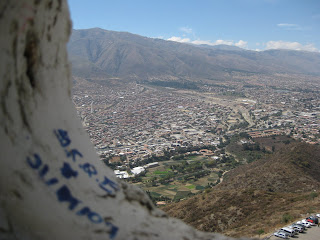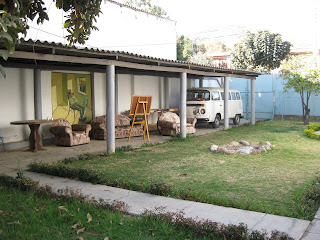If you ever come visit, I can give you directions. In other words, I just passed the halfway mark and feel that I can confidently say that I have settled into Cochabamba. I ran through all the basics - bought a cell phone, a Bolivian SIMM card and minutes, secured internet and a working computer charger. (This was done after Raffo, my Bolivian dad, pulled out the pesky third prong of my charger). I became the proud owner of a TIGO USB internet stick so I could go mobile and connect to a 3G network; i
magine trying to browse the internet and run an inappropriate amount of tabs on Firefox using an iPhone. I just assumed I had the when-traveling-in-a-developing-country-do-the-following¨ formula down. Not in Cochabamba.
I intentionally arrived on a Friday to have the weekend to familiarize myself. I quickly realized I was limited effectively to the the suburbs for three days. I panicked because I am in a very nice apartment building, Cochabamba Proper, if you will. I had come to apply what I study at Furman - Political Science/poverty/Latin American studies -
and found myself in a sanitized suburb. One can´t exactly feel the movement from 3b. Surely I was cheating on solidarity with my fancy address!
My home-stay is very "safe" meaning I live in a very modern apartment building kilometers away from the city center, and thus the Plaza Principal that hosts all the political activity. As I write this, the hunger strike just ended Sunday and there have already been two protests this week (it is Tuesday). Ironically, part of me is slightly relieved because I am more aware of my personal safety here then every before. Stories circulate about the friends of friends who have been mugged, hurt or scared. So for now 3b will work until my Spanish catches up with my political curiosity. I can't exactly ask the person with the knife to wait while I conjugate verbs.
The first day my orientation started when I was picked up and shown how to use public transportation.
You might be thinking,
shouldn’t you know how to use public transportation if your traveling this much? Maybe you should re-think your blog name... I know it seems basic, but it really is a game you have to learn. There are cultural cues, social norms and rules you have to be introduced to. I catch a trufi, a glorified minivan/microbus, five times a day. Line 260. You exit and leave at any time. I try my best not to be conscious of my Spanish and therefore rendered mute, but it is hard. Especially after I learned I was yelling the wrong phrase, instead of "voy a bajar," I was confidently parroting "voy a dejar." I now just stick with ¨la esquina por favor¨ or simply follow someone out. The other day when I asked to stop, a man in the front seat literally turned around to see who was speaking with the accent.
My research paid off because my school,
Bolivia Sostinable is legit. It is exactly like the
Vista House, an intentional community. It is a communal house hosting residents, the office, and classrooms. There is even an Art Resident (Vista house addition, no ve?).
My saving grace was catalyzed by an announcement my first day at Bolivia Sostinable for a politics lecture! I was able to get more of a grasp on the last 8 years, 5 presidents, the Water War, Gas War, and exactly why there is no longer a US Ambassador, DEA or Peace Corps presence. This was complimented by my city tour where I witnessed a military demonstration and my first Cochabamba protest. I don't exactly know what the issue was, but I think land rights. My protest vocabulary set was not exactly up to par yet, but I did recognize the word justicia.
In the absence of a map (naturally, the tourist office shut down for the week while the government changed over) I started using God and graffiti to orient myself. They are static and easy to remember. Street names are more challenging – they are mostly other inanimate objects such as countries (Espana, Ecuador, America) or dates (14 de septiembre, 9 de abril). I assume with 188 coups in 157 years, it is safer to name streets after famous dates than fleeting heads-of-state.
I know that I need to keep Jesus (that statue that is) on my left on the way to school and behind me to go home. If I take a taxi to the school, I follow the wall that begins with instructions to ¨resist the working class¨and concludes with the ominous "Assassinate Evo." To go to the Plaza Principal, I connect the dots of unimaginative communist graffiti all the way down calle Sucre. It is time to get off for Taraja when I am informed, in English, PUNK IS DEAD. I was terribly late on morning when I passed a huge mural depicting the Water Wars and their slogan ¨el agua es nuestro, carajo." (The fact I liked the mural and would have trouble relocating it meant I was kilometers away from my destination). I
eventually was able to consecrate my
fresh-from-the-US-it-took-2-weeks-thanks-mom and dad for all your help-debit card in the Anarchy ATM Machine, instructing us to "destroy and rebuild." Finally, I designated my favorite work of graffiti ¨libre palestina,¨ complete with a picture and a slogan. It is not
Banksy, but I take it as a christening each time I pass under the bridge that welcomes me back to the suburbs. I am reminded why I am here. I am in Cochabamba, laying my pride on the line, to learn radical spanish, one saturated with politics.
I am "arming my voice." From 3b to Bolivia Sostinable:
Leave Edificio Altamira, calle America

Flag a truffie from line 260

Keep Jesus on your left as you head into the city



Arrive at Bolivia Sostinable

My teacher and I abandoned the charming 2 person classrooms to work outside

Important Landmarks:

"Resist the Working Class"

"Free Palestine"

"Destroy and Rebuild"

This is my "I-am-a-quasi-tourist-but-live-here, don't-rob-me-outfit"
No bag + pants = cell phone + cash --> I bought flowers for my home-stay family on my first visit to La Cancha, the largest market in South America





















